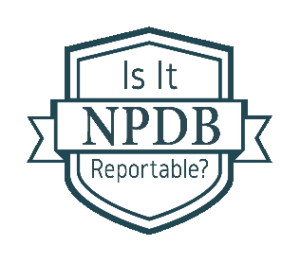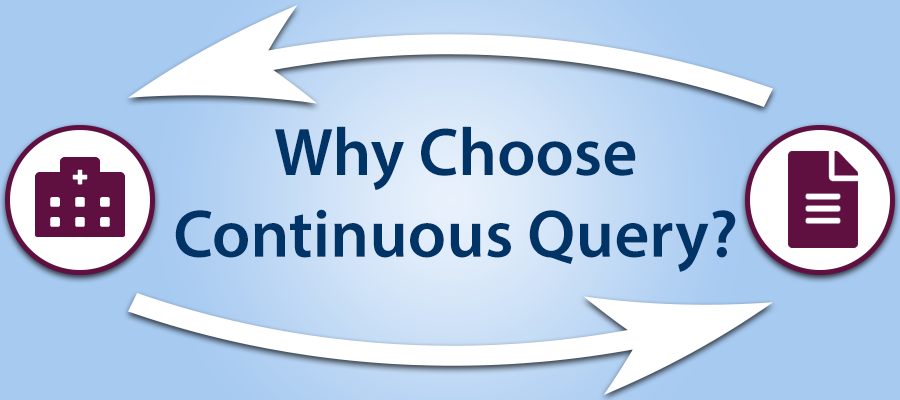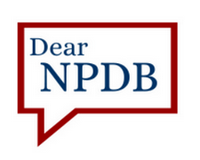NPDB Insights - May 2024
Register Now for the NPDB Resources Webinar
Join us on Tuesday, June 18, 2024, from 2:00 to 3:00 p.m. Eastern time for an interactive webinar for NPDB users and researchers. The presentation will showcase tips for using popular resources such as the NPDB Guidebook, Infographics, and Compliance Map. In addition, the presentation will include a detailed discussion about the content and usage of the NPDB Data Analysis Tool (DAT) and Public Use Data File (PUF).
NPDB staff members will host a Q&A session after the presentation. A recording of the webinar will be available about 1 week after the live presentation. Attendees of the live webinar can request a 1.0 NAMSS-approved Continuing Education Unit (CEU) credit. Please request the CEU credit when registering for the event. NAMSS certificates will be sent out 1-2 weeks after the webinar.
Please register in advance if you wish to join us.

Is It Reportable?
A physician holding courtesy privileges in a hospital applied for and was granted full staff privileges. As a condition of staff privileges, the physician is required to be on-call in the emergency department for one weekend a month. Due to personal reasons, the physician told the hospital he would not be able to fulfill his emergency department commitment. The physician did not miss any on-call duties. The hospital and physician eventually agreed to change his clinical privileges from full staff to courtesy (with no professional review of the matter). Should this be reported to the NPDB?
No. This change in clinical privileges should not be reported because it is not the result of a professional review action based on the physician's professional competence or conduct that affects or could adversely affect the health or welfare of a patient.

Using Continuous Query for Applicants, Locum Tenens, and Temporary Practitioners
Did you know that using Continuous Query allows you to manage temporary practitioners?
When enrolling a practitioner in Continuous Query, at the bottom of the Subject Information page, you can select the type of practitioner: "privileged staff or employee," "temporary or locum tenens," or "applicant."

After selecting "temporary or locum tenens" or "applicant," you must enter a planned cancellation date for the enrollment, which can be changed if your organization extends its relationship with the practitioner. You can convert an active "applicant" enrollment to a "privileged staff or employee" enrollment by selecting that option to update the applicant's status, at no additional cost. This removes the "applicant" status and planned cancellation date from the enrollment. The enrollment will be active until it expires or is canceled.
Entity Subject Identification Number
Entity Subject Identification Numbers are unique numbers you can assign to your enrolled practitioners. They are unique internal reference numbers you can add to any enrollment. A unique number makes it easy to locate a specific enrollment from your list.
Why Choose Continuous Query?
24 hours a day, 365 days a year, Continuous Query keeps you informed about your enrolled practitioners. Unlike a One-Time Query, which only provides a snapshot of information about your practitioner, Continuous Query allows you to receive email notifications within 24 hours of a report received by the NPDB. Like a One-Time Query, Continuous Query meets legal and accreditation requirements for querying the NPDB.
Visit our How to Use Continuous Query page to learn more.

Dear NPDB
One of our practitioners only has temporary privileges. Do I still have to report actions taken against him or her?
Yes, reporting is required in this situation. For reporting purposes, the NPDB does not distinguish between temporary privileges and clinical privileges. You must submit a report if your organization takes a reportable action against a practitioner who holds temporary privileges.
Do not submit a report to the NPDB if all of the following are true: 1) a practitioner is given temporary privileges for a specific amount of time with no opportunity for renewal, 2) both the practitioner and the privileging party agree that those privileges are temporary, and 3) those privileges expire while the practitioner is under investigation. In this scenario, there is no opportunity to renew the temporary privileges, so the expiration of the privileges while under investigation cannot be considered a nonrenewal or surrender of clinical privileges while under investigation.
However, an actual surrender of active privileges while under investigation – even if those privileges are temporary – must be reported.
See the Temporary Clinical Privileges section of the NPDB Guidebook for more information. For more examples of when to report temporary privileges, see the following Q&As:
- A hospital initiated an investigation related to the professional conduct of a physician who held time-limited, nonrenewable, temporary privileges at the hospital...
- An anesthesiologist is hired by the hospital's anesthesia group and receives temporary privileges while his application for clinical privileges is pending the formal review process...
My practitioner applied for temporary privileges. Do I have to query on the practitioner?
Yes. Hospitals must, and other entities may, query any time they grant a practitioner clinical privileges, even if those privileges are temporary.
The latest updates and resources are available at https://www.npdb.hrsa.gov.
Previous editions of NPDB Insights are available in our archive.
 An official website of the United States government.
An official website of the United States government.

